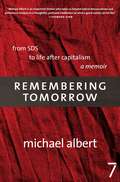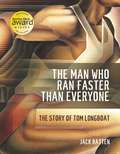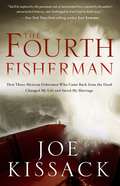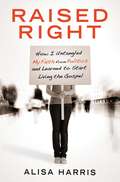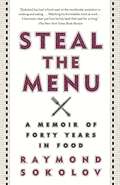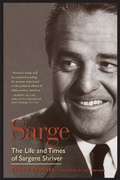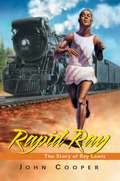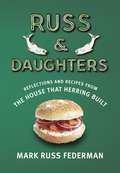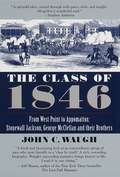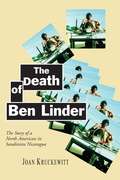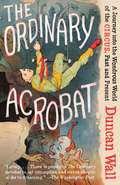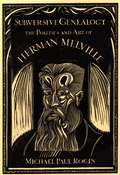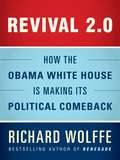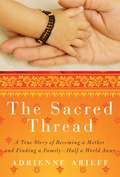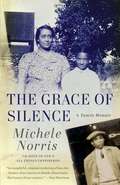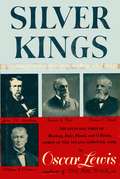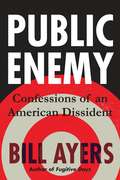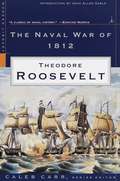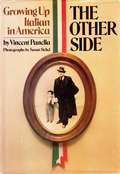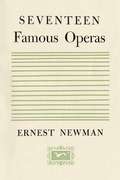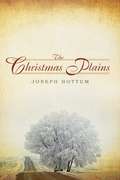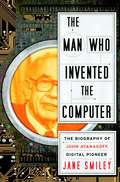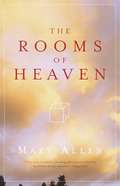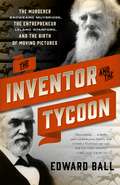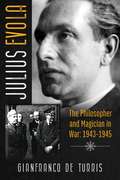- Table View
- List View
Remembering Tomorrow: From SDS to Life After Capitalism: A Memoir
by Michael AlbertIn this lucid political memoir, veteran anti-capitalist activist Michael Albert offers an ardent defense of the project to transform global inequality. Albert, a uniquely visionary figure, recounts a life of uncompromising commitment to creating change one step at a time. Whether chronicling the battles against the Vietnam War, those waged on Boston campuses, or the challenges of creating living, breathing alternative social models, Albert brings a keen and unwavering sense of justice to his work, pointing the way forward for the next generation.
The Man Who Ran Faster Than Everyone: The Story of Tom Longboat
by Jack BattenTom Longboat was a hero. A member of the Onondaga Nation, he was born on the Six Nations reserve in Oshwegen, near Brantford, Ontario. Despite poverty, poor training, and prejudice, Longboat went on to become one of the world's best runners. In 1907, at the height of his fame, he won the Boston Marathon and ran in the 1908 Olympic Marathon. Longboat was one of the best-known people of his day, and certainly the most prominent member of the Six Nations. Throughout his career he had to race against opponents, as well as rumors of illegal running activities. Nevertheless, he maintained his dignity, and his achievements still inspire people who understand the great pleasure of running, and running fast.From the Trade Paperback edition.
The Fourth Fisherman: How Three Mexican Fishermen Who Came Back from the Dead Changed My Life and Saved My Marriage
by Joe KissackWe each came to a moment of brokenness;what we found there was God.And he was enough. It was the subject of headlines around the world: Three Mexican fishermen in a small open boat without any supplies, drifting for more than nine months and 5,500 miles across the Pacific Ocean. Through blistering sun and threatening storms, they battle starvation, dehydration, hopelessness, and death. Their lifelines? An unwavering faith and a tattered Bible. Thousands of miles away, Joe Kissack, a successful Hollywood executive, personified the American dream. He enjoyed the trappings of the good life: a mini mansion, sports cars, and more. He had it made. Yet the intense pressure of his driven and high-powered career sends him into a downward spiral, driving him deep into suicidal depression, insidious addictions, and alienation from his family. His lifelines? A friend and a Bible on the table between them. Thoughtfully told with candor and humor, Kissack weaves together the incredible true voyage of fishermen adrift in the sea and his own life's journey as a man lost in the world. It is a story that will buoy your spirit and renew your hope and faith.
Raised Right: How I Untangled My Faith from Politics
by Alisa HarrisMeet the new breed of Christians shaping our culture.Alisa Harris grew up in a family that actively fought injustice and moral decay in America. She spent much of her childhood picketing abortion clinics and being home-schooled in the ways of conservative-Republican Christianity. As a teen she firmly believed that putting the right people in power would save the nation.But as she moved into adulthood, Alisa confronted unexpected complexities on issues that used to seem clear-cut. So, she set about evaluating the strident partisanship she had grown up with, considering other perspectives while staying true to the deep respect she held for her parents and for the Christian principles that had always motivated her.Raised Right is not only an intriguing chronicle of Alisa's personal journey; it also provides a fascinating glimpse into the worldview of a younger generation of faith--followers of Christ who believe that the term "Christian" is not synonymous with a single political party or cultural issue.Whether you are moderate, conservative, or progressive, Raised Right will prompt you to consider more deeply what it means to affirm Christ-like justice, mercy, and righteousness in the current cultural landscape. And it will give you a deeper understanding of how the new generation of Christians approaches the intersection of faith and politics.From the Trade Paperback edition.
Steal the Menu: A Memoir of Forty Years in Food
by Raymond SokolovFour decades of memories from a gastronome who witnessed the food revolution from the (well-provisioned) trenches--a delicious tour through contemporary food history. When Raymond Sokolov became food editor of The New York Times in 1971, he began a long, memorable career as restaurant critic, food historian, and author. Here he traces the food scene he reported on in America and abroad, from his pathbreaking dispatches on nouvelle cuisine chefs like Paul Bocuse and Michel Guérard in France to the rise of contemporary American food stars like Thomas Keller and Grant Achatz, and the fruitful collision of science and cooking in the kitchens of El Bulli in Spain, the Fat Duck outside London, and Copenhagen's gnarly Noma. Sokolov invites readers to join him as a privileged observer of the most transformative period in the history of cuisine with this personal narrative of the sensual education of an accidental gourmet. We dine out with him at temples of haute cuisine like New York's Lutèce but also at a pioneering outpost of Sichuan food in a gas station in New Jersey, at a raunchy Texas chili cookoff, and at a backwoods barbecue shack in Alabama, as well as at three-star restaurants from Paris to Las Vegas. Steal the Menu is, above all, an entertaining and engaging account of a tumultuous period of globalizing food ideas and frontier-crossing ingredients that produced the unprecedentedly rich and diverse way of eating we enjoy today.
Sarge: The Life and Times of Sargent Shriver
by Scott StosselAs founder of the Peace Corps, Head Start, the Special Olympics (with wife Eunice Kennedy Shriver), and other organizations, Sargent Shriver was a key social and political figure whose influence continues to the present day. This authorized biography, exhaustively researched and finely rendered by Scott Stossel (deputy editor of The Atlantic), reads like an epic novel, with "Sarge" marching through the historical events of the last century--the Great Depression, World War II, JFK's assassination, the Cold War, and many more. Sarge gives us a complete account of Shriver's life, as well as a thoughtful commentary on the Kennedy family, the Peace Corps, and United States and world history. It is a riveting and comprehensive reconstruction of a life that exemplifies what it means to be a true American.
Rapid Ray: The Story Ray Lewis
by John CooperRapid Ray Lewis was arguably the fastest man of his generation. He won medals in the 1932 Olympics and the 1934 British Empire Games, and countless races in North America. Remarkable achievements for any man - but all the more remarkable because Lewis had to race poverty and prejudice. The geat-grandson of slaves, he worked as a porter on the railway, and trained by running alongside the tracks when the train was stopped on the prairies.Rapid Ray is far more than a sports autobiography; it is as much a history of one man's battle for equality as it is a history of Olympic-level track. Throughout his long life - he is now in his nineties - Ray Lewis has fought discrimination not only in sports, but in every walk of life.From the Trade Paperback edition.
Russ & Daughters: Reflections and Recipes from the House That Herring Built
by Calvin Trillin Mark Russ FedermanWITH 8 PAGES OF FULL-COLOR PHOTOGRAPHS AND BLACK-AND-WHITE IMAGES THROUGHOUTThe former owner/proprietor of the beloved appetizing store on Manhattan's Lower East Side tells the delightful, mouthwatering story of an immigrant family's journey from a pushcart in 1907 to "New York's most hallowed shrine to the miracle of caviar, smoked salmon, ethereal herring, and silken chopped liver" (The New York Times Magazine). When Joel Russ started peddling herring from a barrel shortly after his arrival in America from Poland, he could not have imagined that he was giving birth to a gastronomic legend. Here is the story of this "Louvre of lox" (The Sunday Times, London): its humble beginnings, the struggle to keep it going during the Great Depression, the food rationing of World War II, the passing of the torch to the next generation as the flight from the Lower East Side was beginning, the heartbreaking years of neighborhood blight, and the almost miraculous renaissance of an area from which hundreds of other family-owned stores had fled. Filled with delightful anecdotes about how a ferociously hardworking family turned a passion for selling perfectly smoked and pickled fish into an institution with a devoted national clientele, Mark Russ Federman's reminiscences combine a heartwarming and triumphant immigrant saga with a panoramic history of twentieth-century New York, a meditation on the creation and selling of gourmet food by a family that has mastered this art, and an enchanting behind-the-scenes look at four generations of people who are just a little bit crazy on the subject of fish.Color photographs © Matthew HranekFrom the Hardcover edition.
The Class of 1846: From West Point to Appomattox: Stonewall Jackson, George McClellan, and Their Br others
by John WaughNo single group of men at West Point--or possibly any academy--has been so indelibly written into history as the class of 1846. The names are legendary: Thomas "Stonewall" Jackson, George B. McClellan, Ambrose Powell Hill, Darius Nash Couch, George Edward Pickett, Cadmus Marcellus Wilcox, and George Stoneman. The class fought in three wars, produced twenty generals, and left the nation a lasting legacy of bravery, brilliance, and bloodshed.This fascinating, remarkably intimate chronicle traces the lives of these unforgettable men--their training, their personalities, and the events in which they made their names and met their fates. Drawing on letters, diaries, and personal accounts, John C. Waugh has written a collective biography of masterful proportions, as vivid and engrossing as fiction in its re-creation of these brilliant figures and their pivotal roles in American history.From the Trade Paperback edition.
The Death of Ben Linder: The Story of a North American in Sandinista Nicaragua
by Joan KruckewittIn 1987, the death of Ben Linder, the first American killed by President Reagan's "freedom fighters" -- the U.S.-backed Nicaraguan Contras -- ignited a firestorm of protest and debate. In this landmark first biography of Linder, investigative journalist Joan Kruckewitt tells his story. In the summer of 1983, a 23-year-old American named Ben Linder arrived in Managua with a unicycle and a newly earned degree in engineering. In 1986, Linder moved from Managua to El Cuá, a village in the Nicaraguan war zone, where he helped form a team to build a hydroplant to bring electricity to the town. He was ambushed and killed by the Contras the following year while surveying a stream for a possible hydroplant. In 1993, Kruckewitt traveled to the Nicaraguan mountains to investigate Linder's death. In July 1995. she finally located and interviewed one of the men who killed Ben Linder, a story that became the basis for a New Yorker feature on Linder's death. Linder's story is a portrait of one idealist who died for his beliefs, as well as a picture of a failed foreign policy, vividly exposing the true dimensions of a war that forever marked the lives of both Nicaraguans and Americans.
The Ordinary Acrobat: A Journey into the Wondrous World of the Circus, Past and Present
by Duncan WallThe extraordinary story of a young man's plunge into the unique and wonderful world of the circus--taking readers deep into circus history and its renaissance as a contemporary art form, and behind the (tented) walls of France's most prestigious circus school. When Duncan Wall visited his first nouveau cirque as a college student in Paris, everything about it--the monochromatic costumes, the acrobat singing Simon and Garfunkel, the juggler reciting Proust--was captivating. Soon he was waiting outside stage doors, eagerly chatting with the stars, and attending circuses two or three nights a week. So great was his enthusiasm that a year later he applied on a whim to the training program at the École Nationale des Arts du Cirque--and was, to his surprise, accepted. Sometimes scary and often funny, The Ordinary Acrobat follows the (occasionally literal) collision of one American novice and a host of gifted international students in a rigorous regimen of tumbling, trapeze, juggling, and clowning. Along the way, Wall introduces readers to all the ambition, beauty, and thrills of the circus's long history: from hardscrabble beginnings to Gilded Age treasures, and from twentieth-century artistic and economic struggles to its brilliant reemergence in the form of contemporary circus (most prominently through Cirque du Soleil). Readers meet figures past--the father of the circus, Philip Astley; the larger-than-life P. T. Barnum--and present, as Wall seeks lessons from innovative masters including juggler Jérôme Thomas and clown André Riot-Sarcey. As Wall learns, not everyone is destined to run away with the circus--but the institution fascinates just the same. Brimming with surprises, outsized personalities, and plenty of charm, The Ordinary Acrobat delivers all the excitement and pleasure of the circus ring itself.
SUBVERSIVE GENEALOGY
by Michael Paul RoginIn this major reconsideration of Herman Melville's life and work, Michael Paul Rogin shows that Melville's novels are connected both to the important issues of his time and to the exploits of his patrician and politically prominent family--which, three generations after its Revolutionary War heroes, produced an alcoholic, a bankrupt, and a suicide. Rogin argues that a history of Melville's fiction, and of the society represented in it, is also a history of the writer's family. He describes how that family first engaged Melville in and then isolated him from American political and social life. Melville's brother and father-in-law are shown to link Moby-Dick to the crisis over expansion and slavery. White-Jacket and Billy Budd, which concern shipboard conflicts between masters and seamen, are related to an execution at sea in which Melville's cousin played a decisive part. The figure of Melville's father haunts The Confidence Man, whose subject is the triumph of the marketplace and the absence of authority. A provocative study of one of our supreme literary artists.
Revival 2.0: How the Obama White House Is Making Its Political Comeback
by Richard WolffeRevival 2.0 tells the dramatic inside story of how President Obama and his team have regained their footing and learned to fight for their political survival.Bestselling Obama biographer Richard Wolffe (author of Renegade and Revival) follows President Barack Obama and his inner circle (including Valerie Jarrett, David Plouffe, Hillary Clinton, David Axelrod, and Robert Gibbs), from the Democratic defeat in the 2010 midterm election through their suprising resurgence over the last six months. Drawing on key sources within the West Wing, Revival 2.0 reveals:· The story behind the personnel shake-ups and reorganization of the administration--from the departure of Rahm Emanuel and Robert Gibbs to the arrival of new figures the likes of Bill Daley and Jay Carney.· How the White House effectively pushed through their agenda (including the START treaty and repeal of "don't ask, don't tell") with a lame-duck Congress, and positioned itself well in dealing with the new Republican-controlled House over the looming budget battles and a defense of their health care plan.· The internal debate between Survivalists and Revivalists over the response to the revolutions in Tunisia, Egypt, and Libya.· The campaign strategy for the 2012 election as told directly by Obama's top campaign team--David Axelrod and David Plouffe in particular.· Key insights into the killing of Osama bin Laden, how it's the crowning achievement of Obama's political turnaround, and solidifies his stature as commander-in-chief in the war on terror.An up-to-minute guide on how an administration attempts to navigate dangerous political waters, Revival 2.0 is a must-read to understanding how Obama has grown into his role as a president and has found a way to lead effectively.
The Sacred Thread: A True Story of Becoming a Mother and Finding a Family--Half a World Away
by Adrienne ArieffA touching and surprising memoir about one woman's journey to motherhood and family that illustrates the power of love and triumph of the human spirit.After three heartbreaking losses, Adrienne Arieff thought her dreams of becoming a mother might never come true. She and her husband soon discovered, however, that parenthood was still possible, but it would require a gift from a perfect stranger, faith and determination. Half a world away, in a small village in India, Vaina was happily married with three small children, but with little means to support her family or to build a better life. So Adrienne traveled to Anand, in a remote rural pocket of India near the Pakistani border, where the Akansksha clinic is located, to meet with Dr. Nayna Patel, an expert in surrogacy. There, Adrienne met Vaina, who courageously agreed to be a surrogate and carry Adrienne's child, an act which would, in turn, help Vaina to provide for her own children. After a course of IVF in India, Adrienne's role was just beginning in a process that as yet has no firm set of social mores. Unlike many genetic moms who return to their homes and wait for their baby to be born, Adrienne couldn't bear to have this pregnancy progress without her. She wanted to feel a connection both to her growing child and to Vaina, the woman who was offering this remarkable gift. So Adrienne decided to go back to Anand, to be Vaina's partner for the last months of her pregnancy. This choice brought its own heartaches and revelations, chief among them, how do you develop a relationship when you don't share a language or culture? But somehow these two mothers, united by a shared goal, found that within weeks, they could say anything and everything with just one look, one squeeze of the hand, one smile. Poignant, eye-opening, and bittersweet, The Sacred Thread is a memoir of the astonishing journey these two young women took to create a family through international surrogacy. It is the very personal story of embarking upon this process, and shedding light on a growing medical trend that is often shrouded in misconception and prejudice. But, more importantly, The Sacred Thread is a tale of immersing oneself in a foreign culture and foreign land; becoming part of a group of expectant mothers, bonded by their hope for children, and following them on the euphoric highs and crushing lows of their journey; and the development of a deep bond between women who have absolutely nothing in common, except for a shared love of family and children.From the Hardcover edition.
The Grace of Silence: A Memoir
by Michele NorrisIn the wake of talk of a "postracial" America upon Barack Obama's ascension as president of the United States, Michele Norris, cohost of National Public Radio's flagship program All Things Considered, set out to write, through original reporting, a book about "the hidden conversation" on race that is unfolding nationwide. She would, she thought, base her book on the frank disclosures of others on the subject, but she was soon disabused of her presumption when forced to confront the fact that "the conversation" in her own family had not been forthright. Norris unearthed painful family secrets that compelled her to question her own self-understanding: from her father's shooting by a Birmingham police officer weeks after his discharge from the navy at the conclusion of World War II to her maternal grandmother's peddling pancake mix as an itinerant Aunt Jemima to white farm women in the Midwest. In what became a profoundly personal and bracing journey into her family's past, Norris traveled from her childhood home in Minneapolis to her ancestral roots in the Deep South to explore the reasons for the "things left unsaid" by her father and mother when she was growing up, the better to come to terms with her own identity. Along the way she discovered how her character was forged by both revelation and silence. Extraordinary for Norris's candor in examining her own racial legacy and what it means to be an American, The Grace of Silence is also informed by rigorous research in its evocation of time and place, scores of interviews with ordinary folk, and wise observations about evolving attitudes, at once encouraging and disturbing, toward race in America today. For its particularity and universality, it is powerfully moving, a tour de force.From the Hardcover edition.
Silver Kings
by Oscar LewisThe Lives and Times of MacKay, Fair, Flood, and O'Brien, Lords of the Nevada Comstock Lode
Public Enemy: Confessions of an American Dissident
by Bill AyersIn this sequel to Fugitive Days, Ayers charts his life after the Weather Underground, when he becomes the GOP's flaunted "domestic terrorist," a "public enemy." Labeled a "domestic terrorist" by the McCain campaign in 2008 and used by the radical right in an attempt to castigate Obama for "pallin' around with terrorists," Bill Ayers is in fact a dedicated teacher, father, and social justice advocate with a sharp memory and even sharper wit. Public Enemy tells his story from the moment he and his wife, Bernardine Dohrn, emerged from years on the run and rebuilt their lives as public figures, often celebrated for their community work and much hated by the radical right. In the face of defamation by conservative media, including a multimillion-dollar campaign aimed solely at demonizing Ayers, and in spite of frequent death threats, Bill and Bernardine stay true to their core beliefs in the power of protest, demonstration, and deep commitment. Ayers reveals how he has navigated the challenges and triumphs of this public life with steadfastness and a dash of good humor--from the red carpet at the Oscars, to prison vigils and airports (where he is often detained and where he finally "confesses" that he did write Dreams from My Father), and ultimately on the ground at Grant Park in 2008 and again in 2012.
The Naval War of 1812 (Modern Library War)
by Theodore RooseveltPublished when Theodore Roosevelt was only twenty-three years old, The Naval War of 1812 was immediately hailed as a literary and scholarly triumph, and it is still considered the definitive book on the subject. It caused considerable controversy for its bold refutation of earlier accounts of the war, but its brilliant analysis and balanced tone left critics floundering, changed the course of U.S. military history by renewing interest in our obsolete forces, and set the young author and political hopeful on a path to greatness. Roosevelt's inimitable style and robust narrative make The Naval War of 1812 enthralling, illuminating, and utterly essential to every armchair historian. The books in the Modern Library War series have been chosen by series editor Caleb Carr according to the significance of their subject matter, their contribution to the fieldof military history, and their literary merit.
Seventeen Famous Operas
by Ernest Newman“The great composer does not set to work because he is inspired, but becomes inspired because he is working.” –Ernest Newman In Seventeen Famous Operas, renowned musicologist and music critic Ernest Newman goes beyond simply retelling the plots of the operas he has chosen to feature in this volume. Because for Newman, opera was theater—and he demonstrates that with his in-depth studies of the seventeen featured operas. Newman uses biographical, literary, and historical background to expose the reader to how each featured work came to be. These featured works include La Boheme, Madame Butterfly, Carmen, La Traviata, The Marriage of Figaro, The Barber of Seville, The Magic Flute and ten other famous works. Seventeen Famous Operas is a must-read for music librarians, opera lovers, and propagandists of music everywhere.
The Christmas Plains
by Joseph BottumA well-respected writer and editor's memoir of childhood Christmases set in the sometimes harsh but always captivating landscape of South Dakota.Wreaths and holly, fruitcakes and mistletoe, ornaments and snowflakes, St. Nick and Scrooge's humbug, Joseph and Mary, a young child in a manger and magi from the East. These words automatically stir up the season of Christmas and invoke memories of family and friends and hope and faith. By turns sweet and comic, sentimental and serious, the former editor of First Things magazine shares his reflections of the mad joys and wild emotions of the season while growing up on the South Dakota plains.
The Man Who Invented the Computer
by Jane SmileyFrom one of our most acclaimed novelists, a David-and-Goliath biography for the digital age.One night in the late 1930s, in a bar on the Illinois-Iowa border, John Vincent Atanasoff, a professor of physics at Iowa State University, after a frustrating day performing tedious mathematical calculations in his lab, hit on the idea that the binary number system and electronic switches, combined with an array of capacitors on a moving drum to serve as memory, could yield a computing machine that would make his life and the lives of other similarly burdened scientists easier. Then he went back and built the machine. It worked. The whole world changed. Why don't we know the name of John Atanasoff as well as we know those of Alan Turing and John von Neumann? Because he never patented the device, and because the developers of the far-better-known ENIAC almost certainly stole critical ideas from him. But in 1973 a court declared that the patent on that Sperry Rand device was invalid, opening the intellectual property gates to the computer revolution. Jane Smiley tells the quintessentially American story of the child of immigrants John Atanasoff with technical clarity and narrative drive, making the race to develop digital computing as gripping as a real-life techno-thriller.From the Hardcover edition.
The Rooms of Heaven
by Mary Allen"A love story, a memoir, a haunting tale of grief and healing. This book is all that and more." --Chicago TribuneIn the tradition of Susanna Kaysen's Girl, Interrupted and Caroline Knapp's Drinking: A Love Story, Mary Allen tells a riveting love story that explores the uncharted territory between passion and addiction, grief and madness, this world and the next.When Mary Allen falls in love with Jim Beaman, she doesn't know he has a drug problem, but she does sense demons and angels around him, like "a disturbance in the air, a sound just beyond the register of human hearing." And when Jim--discouraged and depressed, struggling with his addiction--kills himself a year into their relationship, Allen is unable to let him go. In her desperate attempts to recover from the loss, she uses a Ouija board and automatic writing to pull back from reality into the dark recesses of her mind, where she believes she can find him. The result is a mesmerizing trip across the boundaries between this world and the afterlife, a journey that leads her to the brink of insanity and ultimately back to herself.From the Trade Paperback edition.
The Inventor and the Tycoon: A Gilded Age Murder and the Birth of Moving Pictures
by Edward BallFrom the National Book Award-winning author of Slaves in the Family, a riveting true life/true crime narrative of the partnership between the murderer who invented the movies and the robber baron who built the railroads. One hundred and thirty years ago Eadweard Muybridge invented stop-motion photography, anticipating and making possible motion pictures. He was the first to capture time and play it back for an audience, giving birth to visual media and screen entertainments of all kinds. Yet the artist and inventor Muybridge was also a murderer who killed coolly and meticulously, and his trial is one of the early instances of a media sensation. His patron was railroad tycoon (and former California governor) Leland Stanford, whose particular obsession was whether four hooves of a running horse ever left the ground at once. Stanford hired Muybridge and his camera to answer that question. And between them, the murderer and the railroad mogul launched the age of visual media. Set in California during its frontier decades, The Tycoon and the Inventor interweaves Muybridge's quest to unlock the secrets of motion through photography, an obsessive murder plot, and the peculiar partnership of an eccentric inventor and a driven entrepreneur. A tale from the great American West, this popular history unspools a story of passion, wealth, and sinister ingenuity.
Julius Evola: The Philosopher and Magician in War: 1943-1945
by Gianfranco de TurrisAn intimate portrait of Evola and his wartime activities that rebuts many of the Fascist pseudo-myths about him • Traces the Baron&’s activities in Italy, Germany, and Austria during World War II • Clarifies Evola&’s relations with Nazism and Fascism and reveals how he passionately rejected both ideologies because they were totalitarian • Draws on personal conversations with those who knew Evola, new documentation never before made public, and letters from the Hakl and Scaligero archives Baron Giulio Cesare Andrea Evola, known to the English-speaking world as Julius Evola (1898–1974), was an Italian philosopher, magician, painter, occultist, Orientalist, linguist, and champion mountain climber. Often considered a pillar of Neo-Fascist thought, Evola opposed Fascism and called himself a &“radical traditionalist.&” In this exploration of Evola&’s inner and outer life from World War II into the early 1950s, Gianfranco de Turris, who knew Evola when he was alive and is the executor of his estate, offers a new portrait of Julius Evola and debunks many of the pseudo-myths about his activities during the war. Drawing on personal conversations with those who knew him and new documentation never before made public, including letters from the Hakl and Scaligero archives, the author traces Evola&’s activities--including his time on the run and living under assumed names--in Italy, Germany, and Austria from 1943 into the mid-1950s. He shares a thorough account of the Baron&’s sojourn at Hitler&’s headquarters in Rastenburg, his work for the German secret military services, and his passionate rejection of the racial theories that were the core of Nazi ideology. The author outlines Evola&’s critiques of Fascism and Nazism and also explores Evola&’s disapproval of the Italian Social Republic because it was destroying traditional values in favor of modernity. Detailing the Baron&’s occult and magical work during the war, de Turris shows that the only thing Evola took with him when he escaped Italy was the UR Group papers, material that would later become the three-volume work Introduction to Magic. Sharing details from Evola&’s long hospital stays during and after the war, the author proves that the injury that led to Evola&’s paralysis was caused by an Allied bombing raid in Vienna and not, as rumor has it, by a sex magic act gone horribly wrong. The author shares photographs from the time period and the Baron&’s correspondence with René Guenon on the possibility of restoring the spiritual and magical power of an authentic Freemasonry. Offering conclusive evidence that Evola was not part of the Nazi regime, de Turris sheds light on the inner workings of this legendary occult figure and what Evola believed was the best approach for the magus to take in the modern world.
